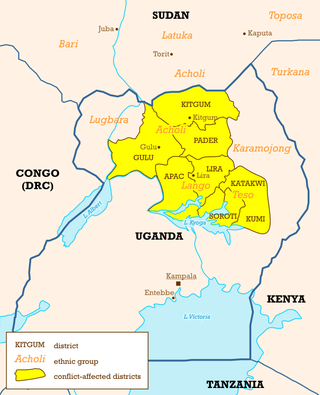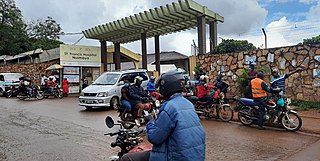Related Research Articles

Uganda, officially the Republic of Uganda, is a landlocked country in East Africa. It is bordered to the east by Kenya, to the north by South Sudan, to the west by the Democratic Republic of the Congo, to the south-west by Rwanda, and to the south by Tanzania. The southern part includes a substantial portion of Lake Victoria, shared with Kenya and Tanzania. Uganda is in the African Great Lakes region, it lies within the Nile basin, and has a varied equatorial climate. As of 2024, it has a population of over 49 million, of which 8.5 million live in the capital and largest city, Kampala.

Idi Amin Dada Oumee was a Ugandan military officer and politician who served as the third president of Uganda from 1971 to 1979. He ruled as a military dictator and is considered one of the most brutal despots in modern world history.
The Gisu people, or Bamasaba people of Elgon, are a Bantu tribe and Bantu-speaking ethnic group of the Masaba people in eastern Uganda, closely related to the Bukusu people of Kenya. Bamasaba live mainly in the Mbale District of Uganda on the slopes of Mount Elgon. The Bagisu are estimated to be about 1,646,904 people making up 4.9% of the total population according to the 2014 National Census of Uganda.
Kiga people, or Abakiga, are a Bantu ethnic group native to south western Uganda and northern Rwanda.
The Hororo or Bahororo are a Bantu-speaking ethnicity mainly residing in the north of the former Kigezi District in southwestern Uganda. In 1905, they were described by a British officer as a "quiet, inoffensive people" who owned cattle. They are made up mostly of the Hima ethnic group and the Bantu ethnic group. They reside mainly in Rujumbura in southwestern Uganda and are related to the Banyankole, Banyoro, Batooro, Songora and Tutsi peoples respectively. Rujumbura was ruled by the BeeneKirenzi sub-clan with Omukama Karegyesa as their last king. The Bahororo speak a dialect of Nkore-Kiga, Ruhororo. They are subdivided into clans that are similar to those of the kingdom of Ankole. Unlike Ankole, which was ruled by the Hinda clan, Mpororo was led by the Bashambo clan.

Lesbian, gay, bisexual, transgender, and queer (LGBTQ) people in Uganda face severe legal and social challenges not experienced by non-LGBTQ residents. Same-sex sexual activity is illegal for both men and women in Uganda. It was originally criminalised by British colonial laws introduced when Uganda became a British protectorate, and these laws have been retained since the country gained its independence.

The Lord's Resistance Army (LRA) is a Christian extremist organization operating in Central Africa and East Africa. Its origins were in the Ugandan insurgency (1986–1994) against President Yoweri Museveni, during which Joseph Kony founded the LRA in 1987.

Nsambya is a hill in the center of Kampala, the capital and largest city in Uganda. The name also refers to the upscale and middle-class neighborhoods that have been developed on the hill and its slopes.
Makerere University Business School (MUBS) is the school of business of Makerere University, Uganda's oldest university. MUBS provides business and management education at the certificate, diploma, undergraduate and postgraduate levels.
The Aya Group of Companies, commonly referred to as the Aya Group, is a business conglomerate based in Uganda.
Imperial Hotels Group is a hotel conglomerate, based in Uganda, with operations in Kampala and Entebbe. The Group is privately owned, with substantial ownership in the hands of Karim Hirji, one of the wealthiest individuals in Uganda.

The Law Development Centre (LDC) is an educational institution in Uganda for higher learning that offers various legal courses ranging from one month to one year.
Ugandan Sign Language (USL) is the deaf sign language of Uganda.
The Weekly Observer is a Ugandan weekly newspaper headquartered in Kamwookya, Kampala. It is one of the largest privately owned papers in the country co-founded by maverick journalist John Kevin Aliro and nine other directors In 2007, its reporter Richard M Kavuma won the CNN Multichoice African Journalist of the Year award. The newspaper was founded in 2004 and celebrated 10 years of existence in March 2014.

The mass media in Uganda includes print, television, radio and online sectors, and coverage is split between both state-run outlets and privately held outlets as well as English-language outlets and Luganda-language outlets.

Samia speaking people live in Western Kenya and Eastern Uganda. They are composed of several clans and their ancient economic activities include fishing in Lake Victoria and other rivers such as River Sio, crop farming (obulimi), and animal farming (obutuki). The Samia speaking people, as widely known by other tribes, predominantly live in Busia districts and speak a dialect similar to the Luhya tribe in Kenya. However, on the Ugandan side there is a slight variation in the dialect spoken by the Samia of Southern Busia on the fringe of Lake Victoria and those of North Busia district closer to Tororo District. The former speak Olusamia while the latter speak Olugwe. The two dialects are difficult to differentiate by non Samia speaking people but easily discernible by the natives. and in Uganda mainly found inbusia and Namayingo district.
The Independent is a news magazine published in Kampala, Uganda.
The Banyaruguru are a closely related ethnic group to the Batutsi, Banyankole, Bahima, Bahororo and Banyamulenge living in northern Rwanda and parts of Uganda. They are found in Kitagwenda, Kamwenge district in Tooro kingdom while others are located on the Ankole hills in Rubirizi district.
The Sarrai Group of Companies, commonly referred to as the Sarrai Group, is a privately owned conglomerate in East Africa and Southern Africa. The group maintains its headquarters in Kampala, Uganda, with subsidiaries in Kenya and Malawi. The group is headed by the executive group chairman, Sarbjit Singh Rai

Mparo Royal Tombs also Mparo tombs is a historical royal burial site for Omukama Kabalega II and kings and royals of Bunyoro-Kitara kingdom. The tombs cover six acres of land.
References
- ↑ petnah (2020-04-28). "The Karamojong of uganda - uganda tribes and their culture". petnah. Retrieved 2024-02-18.